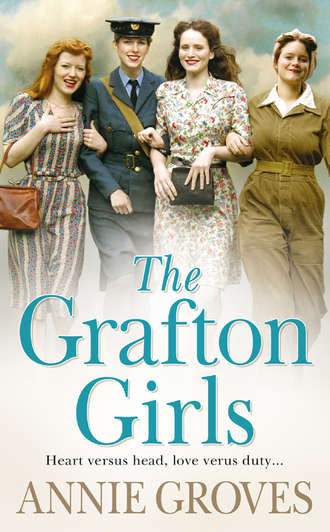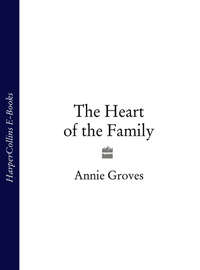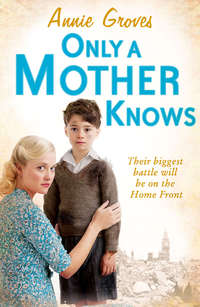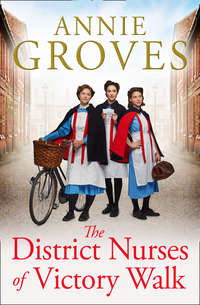
Полная версия
The Grafton Girls

ANNIE GROVES
The Grafton Girls

COPYRIGHT
This novel is entirely a work of fiction.
The names, characters and incidents portrayed in it are the work of the author’s imagination. Any resemblance to actual persons, living or dead, events or localities is entirely coincidental.
Published by HarperCollinsPublishers Ltd 1 London Bridge Street London SE1 9GF
www.harpercollins.co.uk
This paperback edition 2007
1
First published in Great Britain by HarperCollinsPublishers 2007
Copyright © Annie Groves 2007
Annie Groves asserts the moral right to be identified as the author of this work
A catalogue record for this book is available from the British Library
Set in Sabon by Palimpsest Book Production Limited, Grangemouth, Stirlingshire
All rights reserved. No part of this publication may be reproduced, stored in a retrieval system, or transmitted, in any form or by any means, electronic, mechanical, photocopying, recording or otherwise, without the prior permission of the publishers.
This book is sold subject to the condition that it shall not, by way of trade or otherwise, be lent, re-sold, hired out or otherwise circulated without the publisher’s prior consent in any form of binding or cover other than that in which it is published and without a similar condition including this condition being imposed on the subsequent purchaser.
Source ISBN-13: 9780007209675
Ebook Edition © September 2008 ISBN:9780007279517
Version: 2017-09-12
Epigraph
To the readers for their generous reception to the first of my World War Two books. I hope they will enjoy this one as much.
Annie Groves
CONTENTS
TITLE PAGE
COPYRIGHT
EPIGRAPH
PART ONE
ONE
TWO
THREE
FOUR
FIVE
SIX
SEVEN
EIGHT
NINE
TEN
PART TWO
ELEVEN
TWELVE
THIRTEEN
FOURTEEN
FIFTEEN
SIXTEEN
SEVENTEEN
EIGHTEEN
NINETEEN
TWENTY
PART THREE
TWENTY-ONE
TWENTY-TWO
TWENTY-THREE
TWENTY-FOUR
TWENTY-FIVE
TWENTY-SIX
TWENTY-SEVEN
TWENTY-EIGHT
TWENTY-NINE
THIRTY
THIRTY-ONE
EPILOGUE
ACKNOWLEDGEMENTS
ABOUT THE AUTHOR
BY THE SAME AUTHOR
ABOUT THE PUBLISHER
ONE
‘My station’s coming up next, and then it’ll be Lime Street, luv, tek it from me. Done this ruddy train journey that many times, I have, since this bloomin’ war began, I can tell the stops practically in me sleep. That is, of course, if a person could manage to get any sleep with the trains being that full and noisy. Not that I’m complaining, like, not about the overcrowding nor about all the place names being teken down from the stations so as to confuse any of Hitler’s spies wot manage to land. Aye, and if I were your age, I’d be in uniform too. WAAF isn’t it?’ Diane Wilson’s new-found friend said knowingly, referring to the Women’s Auxiliary Air Force, studying Diane’s airforce-blue-clad frame admiringly.
‘That’s right.’ Diane smiled politely enough to be pleasant but not so warmly that she would be encouraging the woman to ask her too many questions.
‘A right ’andsome lot them fly boys are. By, if I had me time again…’ the older woman chuckled.
Now it was harder for Diane to force a responsive smile. Automatically, and despite the fact that she was wearing gloves, she placed her right hand over the bare place on her ring finger. The pain she thought she had under control could sneak up on her to catch her unawares and stab her with such agonising sharpness. She ought to be over it by now. After all, it had been three months. Three months, two days and ten hours, an inner voice tormented her. Resolutely Diane ignored it. She had known other girls, any number of them, who had been stationed with her at Upwood, Cambridgeshire, who had gone from being desperately in love with one chap to clinging happily to the arm of another when they had lost him. So there was no reason why she shouldn’t be doing the same. Only she wouldn’t be clinging – not to any man – not ever again. There was no danger of her repeating that mistake. Sometimes, when she was at her lowest ebb, the horrid thought wouldn’t go away, the thought that it might have been easier to accept things if Kit had been killed instead of…
‘You’ll be heading for that Derby House, then, like as not?’ the woman leaned towards her to whisper, interrupting her reverie. ‘Saw Mr Churchill himself standing outside of it one morning, I did. Smiled at me, an’ all. Hitler might have ’is ruddy SS but just so long as we’ve got our Mr Churchill we’ll be sound, mark my words,’ she added stoutly.
She was a good sort, Diane recognised, a bit shabbily dressed, but then who wasn’t these days, with the war in its third year and new clothes only available if one had enough coupons with which to purchase them. Luckily she had joined the WAAF before clothing coupons had come in, and so she had not had to part with any of her own precious coupons in exchange for her obligatory WAAF uniform of black lace-up shoes, grey lisle stockings, which none of the girls wore during the summer months if they could help it, a skirt, a tunic, a peaked cap – which the girls loved as much as they hated the lisle stockings –an overcoat, which came in jolly useful in the winter, and even regulation underwear, with its horrid bubble-gum-pink ‘foundation garments’, although none of the girls wore these either if they could get away with wearing their own underwear instead.
More seriously, the whole country was now feeling the effect of the food rationing that had been brought in at the beginning of the war, but if Hitler had hoped to destroy the fighting spirit of the British by attempting to sink the ships struggling across the Atlantic to bring in the supplies on which the country depended, he had omitted to take into account the sturdiness of the nation’s spirit, Diane recognised proudly.
Her recent request for a transfer was responsible for Diane’s presence on this train to Liverpool and her new post at Derby House, the headquarters of the combined forces protecting the convoys coming into the port. Her life in Liverpool would be very different from that in Cambridgeshire, she knew. Several of the pals she had been leaving behind had expressed doubts about the wisdom of what she was doing.
‘Liverpool!’ more than one of them had exclaimed, pulling a face. ‘You wouldn’t catch me wanting to transfer up there. Not for anything.’
Diane had affected not to notice the sharp nudge another of her friends had given the speaker, knowing that the warning was kindly meant and intended to protect her feelings. Her broken heart.
She could feel the burning threat of tears at the back of her eyes, and was thankful for the diversion of the sudden hiss of the train’s brakes and the noise of escaping steam, plus the bustle of her travelling companion getting ready to leave the train.
‘Well, here’s my station.’
Diane forced herself to return the woman’s smile.
‘Good luck, lass,’ the older woman said, giving Diane a grateful look as she helped her out of the compartment with her bags. ‘You’ll like Liverpool once you get to know it. Of course, it’s not the place it was, not since that ruddy May bombing back in ’forty-one. A whole week of it, we had, and it ripped the heart out of the city, and no mistake. There was hardly a family in the city that didn’t lose someone, and there were thousands evacuated who didn’t come back. But it takes more than a few bombs to knock the stuffing out of Liverpudlians, as you’ll soon find out.’
The bright summer sunshine was surely enough of an excuse for her to blink, Diane reassured herself as the train pulled out of the station. And if she was also blinking away those threatening tears then who was to know but her? No one here knew anything about her or her situation. That alone was enough to make her glad that the transfer she had begged for had brought her here.
‘HQ Western Approaches won’t be what you’re used to here, Wilson,’ she had been warned when she had been called to the office to receive her new orders from her commanding officer.
‘But I’ll still be working as a teleprinter operator, won’t I, ma’am?’ she had asked, uncertainly.
‘Well, as to that, I dare say that yes, you will. But Derby House is a joint effort run principally by the Senior Service,’ she told Diane, referring to the British Navy, ‘unlike here, where it’s all RAF. It will be part of your duty as a WAAF to make sure that you create the right impression on those you’ll be working with.’ When her CO had added, straight-faced, ‘The Senior Service takes a pretty dim view of flighty behaviour,’ Diane hadn’t known whether or not she was cracking a joke.
‘The CO joke?’ one of her pals had scoffed when she had related the incident to her. ‘That’ll be the day!’
Diane hadn’t really needed her CO’s warning. Everyone in uniform knew about the rivalries between the various services, and that the Senior Service in particular tended to look down somewhat on the upstart RAF.
She could practically hear Kit’s voice now -strong and filled with good humour as he laughed, ‘The trouble with those Senior Service lot is that they’re jealous of our success.’
‘You mean because of the Battle of Britain?’ Diane had asked, thinking he had meant that the navy men envied the victory the RAF had had over the Luftwaffe in the summer of 1940, when men like Kit had driven back the incoming German fighters.
‘No,’ she remembered Kit had told her, his eyes – fighter pilot’s far-seeing eyes – crinkling up at the corners with amusement as he had leaned forward and told her boldly, ‘I meant because of our success with the fairer sex.’
She had pretended to be dismissive, tossing her head as they stood together at the small bar of the packed Cambridgeshire pub on that breathlessly hot summer night, but when a careless airman, overeager to get to the bar before the beer ran out, had accidentally bumped into her, she hadn’t complained when Kit had made a grab for her waist. ‘To protect you,’ he had assured her guilelessly, but he hadn’t been in any hurry to release her, and the truth was that by that stage she had been too entranced by him to want him to. With Kit, over six foot tall, broad-shouldered, with a shock of thick wavy dark hair, and the kind of good looks and easy charm that had already got him a nine out of ten rating in the WAAF canteen, there was barely a girl Diane knew who wouldn’t have fallen for his charms.
But there had been another side to him, or so she had believed. A side that…
The sudden jerk of the train’s brakes brought her back to the present. Already the corridor outside her carriage was packed with passengers wanting to get off. Diane reached up to the overhead luggage rack to remove her kitbag, ready to join the stream of people disembarking at Lime Street.
So this was Liverpool. The voices she could hear all around her certainly had very different accents from those in Cambridgeshire, although the Liverpool accent wasn’t the only one swelling the noise in the busy station, and Diane’s eyes widened a little when she saw – and heard – how many Americans there were clustered around in large groups.
They would, of course, be the ‘Yanks’ from the American base at Burtonwood, which her fellow traveller had mentioned. American bases were being established in Lincolnshire, and at Bomber Command, in High Wycombe, and there had been American personnel at the Cambridgeshire base as well. Diane had heard from some of the other girls about the attractions of the American male and the American PX – as the stores on the newly established American supply bases were named -both generous providers of much that was unavailable or rationed, including chocolate and stockings.
The station platforms were busy with men in uniform, with the distinctively dressed women of the Women’s Voluntary Service also very much in evidence with their tea urns. Diane would not have said no to a cuppa herself, but it had already gone five in the evening and she still had to find her way to her billet near Wavertree.
One of the friendly WVS women was happy to explain to Diane how to get to her billet on Chestnut Close, which was in what she described approvingly as ‘a respectable part of the city’.
‘It’s a fair walk, but you could take the bus.’
‘No, I’d prefer the walk,’ Diane assured her.
The summer sunshine had enough warmth in it to make her walk a pleasant one, and to allow her to pause to stare in shocked compassion at the blitzed and bombed-out centre of the city. She could see huge gaps where it looked as though whole streets had disappeared, and smaller ones, where only a single house had gone, leaving the rest of the street intact.
The city was very different from the pretty Hertfordshire village where she had grown up, Diane acknowledged. Her parents were far from well off, but their semi was one of several on a quiet leafy lane opposite the village green and duck pond. Diane had grown up knowing virtually everyone else who lived in the village. She couldn’t help contrasting the pretty comfortable calm of her home village with the devastation of this powerful northern port city. Her parents had been proud but anxious when she had announced her intention of doing her bit and joining up, and they had been even more anxious when she had told them that she was seeing an airman, insisting that she took him home with her so that they could meet him. Although at first they had been cool towards him, by the time Diane and Kit’s forty-eight-hour pass was up, Kit had completely charmed them. Diane had been so thrilled and proud, both of him and her parents. Of course, the minute her mother had discovered that he was virtually an orphan, having lost his mother shortly after his birth, she had taken to fussing over him. They had laughed about it together later, Kit teasing Diane that once they were married she would never be able to run home to her mother because she would always take his side. She had laughed too, telling him with the assurance that falling in love brought that she would never ever want to run anywhere other than to him.
She had been so deliriously happy, living in a world coloured by her hopes and dreams for the future, even if her heart had been in her mouth during every mission Kit flew, her fear always that he might not make it back. Too happy, she knew now. And her fear should not just have been for Kit’s survival but for the survival of their love.
She had been so busy with her own thoughts whilst she was walking that she hadn’t really observed very much of her surroundings, and it came as a surprise when she realised that she must have passed the hospital she had been told to look out for and that she could now see the Picton Clock landmark she had been warned meant that she had gone too far and missed her turning.
An elderly woman, obviously having noticed her looking around, came over to her.
‘Lost your way, have you?’ she enquired.
‘I’ve been billeted to Chestnut Close,’ Diane explained, ‘but I think I’ve missed my turning.’
‘Well, as to that,’ the other woman sniffed, ‘you have, yes. This is Wavertree, not Edge Hill.’ The way she stressed what she obviously considered to be the superiority of ‘Wavertree’ would normally have made Diane smile. A similarly petty type of snobbery existed in Melham on the Green, the village where she had grown up, with one end of it being considered ‘better’ than the other. Kit had enjoyed teasing her about her mother’s pride in the fact that their well-cared-for semi was just over the invisible border that separated the ‘better’ end of the village from the ‘other’ end. ‘And, of course, we aren’t supposed to give out directions to strangers,’ the elderly lady added pompously.
‘No, indeed,’ Diane responded with suitable gravity. ‘Actually, I do have the directions, but I’ve wandered off track. I believe that I should have turned off left for Chestnut Close before I got here.’
‘There’s some folks that live there that like to claim that it’s in Wavertree, on account of it being on the border, but even if they are right, the better part of Wavertree is further up the road, past the tennis club and that. I expect you play tennis, do you? I used to play myself when I was younger.’
Diane made her excuses as tactfully as she could. The older woman’s question had brought a fresh wave of painful memories. The previous summer she and Kit had just managed to snatch the mixed doubles trophy from the previous year’s winners at the Cambridgeshire courts where they and other members of the RAF squadrons based locally played.
It had been at the tennis club, on a warm September night just after the Battle of Britain, not yet two years ago, that Kit had proposed to her.
If they had got married straight away then, instead of deciding to wait, would things have been any different?
It didn’t take Diane long to retrace her steps and find the turning into Chestnut Close, which turned out to be a neat collection of small semidetached homes and terraces of four interlinked red-brick houses, with low red-brick front garden walls and privet hedges.
Number 24 was about a quarter of the way down Chestnut Close, and Diane suspected that she saw several sets of net curtains twitching as she walked up its tidy gravel path.
The front door was opened the moment she knocked.
‘Come in, dear,’ she was instructed by the small, plump woman in her fifties who greeted her, whom Diane assumed to be her landlady. ‘I’ve bin expecting you. Tired, are you, and parched too, I’m sure? I’ll put the kettle on and then I’ll take you up and show you the room. You’ll be sharing, did they tell you that? Another young lady who’s working at Derby House. I told them when they asked me if I’d have some lodgers that with me being a widow and liking things just so, I’d only take young ladies. Not that some of them I’ve had have been what I’d call “ladies”, but then I can tell that you’re a decent sort. I’m Mrs Lawson, by the way. It’s a good-size room, the largest in the house. It was me and my Herbert’s room but seein’ as I’m on me own now I moved out of it, like, and I got rid of the double, had a pair of single beds put in – there was that many young couples wanting to have it, what with the furniture shortage an’ all, and there’s much more space in the back room now with only a single in it. It’s funny, isn’t it, some folks don’t like sleeping in a single after they’ve shared, but me, I don’t mind at all. I like me own space, you see, and men and marriage -well, they aren’t allus what they’re made out to be, take it from me. It’s this way,’ she continued without pausing for breath, as she started up the stairs, leaving Diane to follow her.
‘Now I’m very fussy about the state of me bathroom – I won’t have no makeup nor any of that fake leg stuff all over everything. Baths are once a week, unless you want to pay for extra. You’ll get your breakfast, and a meal before you go out when you do your night shift. But there’s to be no food taken upstairs to your room. And no followers neither,’ she added firmly. ‘I won’t have no truck with any of that kind of goings-on.’
They had reached the landing and Diane reflected ruefully that beneath Mrs Lawson’s soft outer plumpness lay a core of pure steel.
‘The lady wot you’ll be sharing with is married. Only bin here a couple of weeks herself, she has.’
‘This is the room.’ She gave a small knock on the door and called out, ‘It’s only me, Mrs Stone, duck, bringing up the new lady.’
Diane heard the sound of the door lock being pulled back, and then the door opened.
‘I’ll leave you two to get to know one another whilst I make you both a cuppa,’ Mrs Lawson announced.
‘Not for me, thanks, Mrs L. I’ve got to go soon,’ said the room’s occupant.
‘Right you are, duck,’ said the landlady, leaving Diane and the girl now seated on one of the room’s two narrow single beds to study one another surreptitiously in the slightly awkward silence that followed her exit.
‘I’m Diane – Di,’ Diane introduced herself.
‘Myra Stone,’ the other girl responded.
Diane had never seen a more stunningly beautiful nor sensuously voluptuous-looking young woman. She had the kind of looks that would have turned men’s heads in the street. She had glossy brown curls, and brown eyes that should have looked warm but which instead held an expression of cynical brittleness that both shocked Diane and made her feel wary. Somehow that voluptuous body and those cold eyes just did not match up with one another.
‘You’d better come in and shut the door. I’ve already bagsied this bed,’ Myra told her, indicating the better positioned of the two beds. ‘And I’d better warn you now that there’s next to no wardrobe or drawer space left.’
‘I dare say I’ll be able to manage,’ Diane responded lightly. ‘It can’t be worse than we had at camp. I haven’t lived out before.’
‘Well, you won’t have to bother about curfews or anything like that,’ Myra told her, ‘and the social life’s pretty good up here, especially now that the Yanks have arrived. Have you dated any Yanks yet?’
Diane stiffened. Already a certain amount of competitive hostility had developed between the RAF flyers and the newly arrived Americans. The readiness of some girls to accept ‘dates’, as the Americans called them, from the newcomers had resulted in them being branded as ‘disloyal’, and there had even been incidents of outright hostility, with them being accused of favouring the Americans because of the luxuries they could provide.
‘You’ll be working at Derby House, I expect?’
‘Yes,’ Diane agreed, as she removed her gloves and her jacket, and then lifted her hand to make sure that her blonde hair was still smoothed neatly into its chignon. Her fingers were slender and fine-boned, her wrist blue-veined under creamy skin. Her colouring was more Nordic than English rose, and her father had always teased her that her blonde hair and blue eyes, together with her height and slender frame, were a throwback to some Viking ancestor on her mother’s side of the family. Diane had learned young that her looks made her stand out from the crowd and that sometimes other girls could be wary of her because of them. That in turn had led to her developing an initial defensive calm coolness of manner with people. ‘My Ice Princess’, Kit had called her. Diane knew that she did tend to hide her own shyness away behind a protective front with new people.
‘So what happened to him, then?’
Myra’s question caught her off guard, causing the colour to rise in her face. ‘What happened to who?’ she responded as soon as she had recovered her equilibrium.
‘The chap who gave you the ring you’ve taken off.’ Myra gestured towards Diane’s left hand and then waggled her own ring finger. ‘See, I’ve got the same telltale white mark. I always check out other girls’ ring fingers. It takes one to know one,’ she told Diane drily. ‘Husbands, eh…’
‘We weren’t married, only engaged,’ Diane told her sharply.
‘Lucky you,’ Myra drawled. ‘I just wish I could say the same. But, more fool me, I went and married mine, and you know what they say about marrying in haste? Well, take it from me it’s true.’ She paused and gave Diane a speculative look before demanding, ‘So what happened to him, then? Bought it, did he?’
Diane could hardly believe her ears. For sheer callousness Myra’s question couldn’t be beaten. If Kit had lost his life – or ‘bought it’, as Myra had so casually enquired – Diane knew she would have been overwhelmed with grief by Myra’s nosy probing. She looked angrily across and saw that Myra was waiting almost eagerly for her response. Diane had met women like Myra before, women who were so unhappy in their own lives that they fed off the misery of others. She had always taken care to avoid such types and her heart sank at the realisation that being billeted here meant she was not going to be able to now. Well, she might have to share a room with her, but she certainly wasn’t going to play along and give Myra the satisfaction of seeing her upset, Diane decided firmly.











